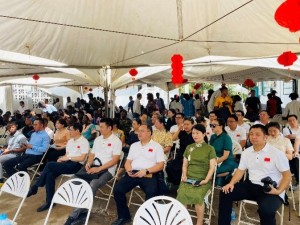By Foday Moriba Conteh
The Confucius Institute of Fourah Bay College, University of Sierra Leone (USL) on Thursday 20th April, 2023 commemorated ‘International Chinese Language Day’ on the theme: “Promoting Civilization Dialogue.” The ceremony which also marked the 14th United Nations Chinese Language Day, which has been celebrated annually on April 20 since 2010 was held at the Confucius Institute of Fourah Bay College on the University of Sierra Leone (USL) Campus in Freetown.
The Chinese Director of the Confucius Institute, Prof. Jing Man, stated in his address that Chinese is an ancient and beautiful language, which is the most spoken language in the world, carrying the wisdom, tradition and culture of China, adding that it is important to rephrase that Chinese is one of the six official languages of the United Nations, and as more and more foreign friends learn Chinese and experience Chinese culture, the world will have a deeper understanding of the profound, hard work and friendship of the Chinese people, and as well understand an innovative, open and inclusive China.
She added that the theme for this year’s commemoration is “Promoting Civilization Dialogue”, which she said aims to provide a communication and dialogue platform for everyone to perceive China, and at the same time promote language and cultural exchanges among people all over the world.
Prof. Jing Man continued that by the end of 2021, 159 countries have established more than 1,500 Confucius Institutes and classrooms through cooperation with China, more than 180 countries have launched Chinese education programs, and 76 countries have included Chinese in their national education systems.
She noted that since the establishment of Confucius Institute at the University of Sierra Leone in 2012, to the enrollment of Chinese undergraduate majors in 2019, the Confucius Institute at USL has built nearly 20 Chinese language teaching sites, and Chinese education in Sierra Leone has continuously leapt to a new level which she said is as a result of the friendly cooperation between China and Sierra Leone.
“We hope that ‘boku boku Salone man dem’, our Sierra Leonean students will get closer to Chinese, Chinese characters, and China, and become promoters, facilitators, and contributors of China-Sierra friendship,” the Director concluded.
The Vice chancellor of Fourah Bay College in Sierra Leone, Prof. Kelleh Mansaray, described the role that Confucius Institute has played in the educational sector of Sierra Leone.
He urged the Institute to expand its space in order to include more local people and assured that Fourah Bay College would provide relevant support in that regard.
Dr. Josephus Brimah, maintained that China is indeed a true friend of Sierra Leone and that the teaching of the Chinese language has further deepened the existing good relations between the two peoples.
Giving the keynote address, the Chinese Ambassador to Sierra Leone, H.E. Ambassador Wang Qing, expressed heartfelt thanks to all the staff of the Confucius Institute at the University of Sierra Leone for their continued efforts and important contributions to helping Sierra Leoneans to learn Chinese language and Chinese culture.
He further thanked the Government of Sierra Leone for its active support in promoting cultural exchanges between China and Sierra Leone.
The Ambassador said that in 2010, the United Nations designated Chinese Language Day for April 20 each year, coinciding with one of the traditional Chinese solar terms “Gu Yu” to commemorate the contribution of CangJie, the “originator of Chinese language” in creating characters.
He stated that more than 20 million people out of China are learning Chinese, and the cumulative number of Chinese learners and users abroad is close to 200 million, adding that the Confucius Institutes, Confucius Classrooms and other Chinese language education institutions have done a lot through their voluntary hard work to provide support to people around the world in learning Chinese and understanding China.
Wang Qing said that the event is not only a program for popularizing the Chinese language, but also an important occasion for appreciating the Chinese culture, as at the event there were various Chinese Clements, including Chinese Opera, Chinese Tea Arts, Chinese Martial Arts, Traditional Chinese Musical Instruments and so on.
Closing the ceremony was the showcasing of the various Chinese Clements, including Chinese Opera, Chinese Tea Arts, Chinese Martial Arts, Traditional Chinese Musical Instruments etc. of which participants after going through the different Chinese Clements were presented gifts.





